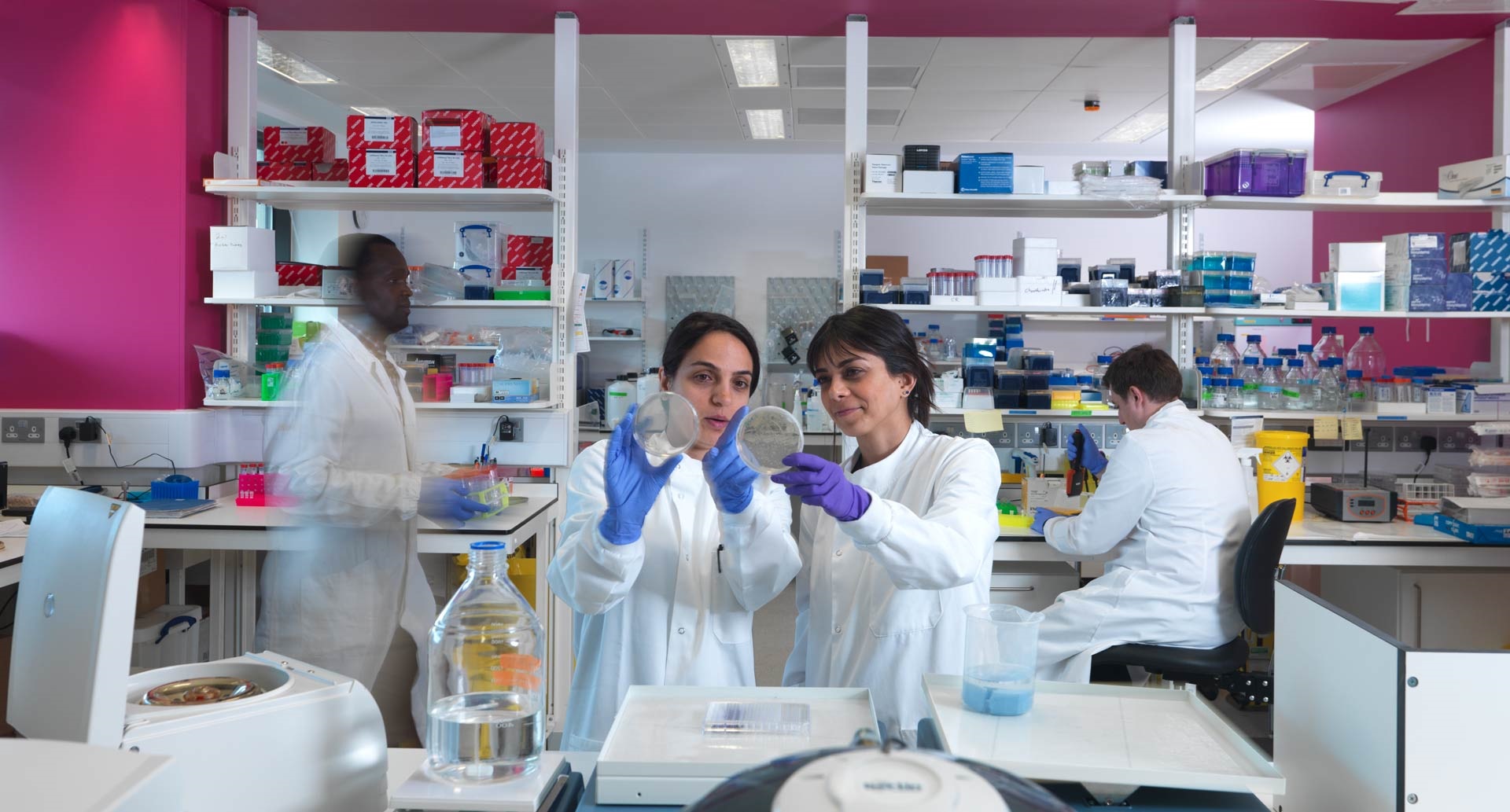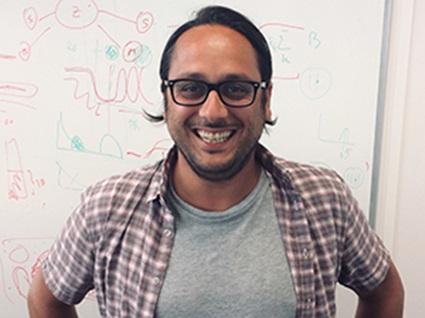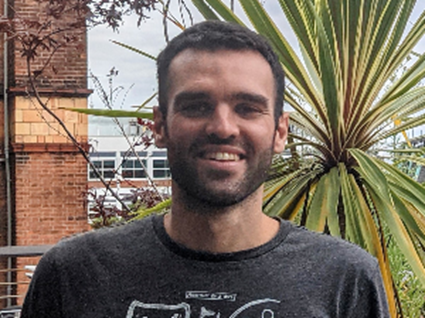Postdocs
As a postdoc at the ICR, you’ll be working at the forefront of cancer research, in an environment that’s collaborative, international and inclusive.
We aim to attract the best scientific minds, wherever in the world they come from. With postdocs from all over the UK and the world, you'll be joining a welcoming community that prioritises training the next generation of world-leading researchers. You’ll also benefit from our strong links with our partner hospital, The Royal Marsden NHS Foundation Trust, as well as our links with companies through industrial partnerships.
Benefits and culture
We offer a competitive salary, rigorous training, many opportunities for professional development, and an open and inclusive working culture. Our PostDoc Association, faculty and learning and development team work closely to support postdocs.
We also offer generous annual leave and family-friendly policies that support parents, including stop the clock, which supports maternity leave during research.
Reimbursing your visa and other costs
Successful applicants will be able to claim the cost of their visa and of the immigration health surcharge (IHS) for themselves and for their dependants once they have joined. This is a taxable benefit. Applicants often find the UK visa application process to be less onerous than for some other countries, such as the United States.
We provide extensive training and development opportunities that will help prepare for your future career inside or outside academia.
Throughout your postdoc fellowship, you’ll be offered training and support to help you to develop your skills in key areas such as high-impact publishing, managing research projects, leadership and career planning.
Getting started
We run training sessions for new postdocs, as well as a postdoc buddy system to help you to settle into your new role. We normally pair you with someone from a different discipline, to broaden your network. We can also try to match you with someone who speaks your native language.
Training and support
As signatories of the Concordat to Support the Career Development of Researchers, we are committed to providing our postdocs with at least 10 days each year for their personal and career development. We offer a wide range of activities that you can tailor to your career stage, research interests and career ambitions. These include:
- On-the-job training – such as shadowing funding panels, grant writing, peer review, supervising and mentoring others, lab visits, committee membership and project-related placements.
- Informal opportunities – such as building professional networks, engaging with the ICR Postdoc Committee, participating in conference organising committees, mentoring (as mentor or mentee), and 1:1 career support with consultants employed by the ICR.
- Formal training and professional development courses – on topics ranging from supervisor training, writing and publishing, and statistics, to project management and entrepreneurship.
The Pathway to Independence – a competitive programme that we run in collaboration with the Wellcome Sanger Institute and CRUK, is also an option for postdocs who are aiming to become academic team leaders.
We also provide training on science communication and outreach to support your participation in our public engagement programme.
You'll be joining a diverse and talented community of postdocs who come to work here from all over the UK and the world.
We’ve around 150 postdocs working at the ICR from across dozens of countries around the world at any one time. Several groups can help you to settle in, build a social network and get involved with life at the ICR.
PostDoc Association
Our Postdoc Association (PDA) brings together postdocs across the ICR for professional and social events, which include away days and conferences. It provides a community for postdocs to feel connected and supported.
Join our networks
From our LGBT+ Network and our forum on race and ethnicity to sports clubs and seminars, you’ll have the chance to connect with like-minded researchers and build your network.
Our active Postdoc and Alumni LinkedIn group is also a great way to connect with others and get answers to common questions – from what it’s like to rent in London to how to set up a UK bank account.
Former ICR postdocs are also welcome to subscribe to Network, our alumni e-newsletter, so they can continue to feel part of our community even after moving on in their careers.
Employee stories
Vacancies at the ICR
Postdoctoral Training Fellow
Under the leadership of Claudio Alfieri, we are seeking to appoint a Postdoctoral Training Fellow to join the Molecular Mechanisms of Cell Cycle Regulation Group at the Chester Beatty Laboratories, Fulham Road in London. This project aims to investigate the molecular mechanisms of cell cycle regulation by macromolecular complexes involved in cell proliferation decisions, by combining genome engineering, proteomics and in situ structural biology. For general information on Post Doc's at The ICR can be found here. Key Requirements The successful candidate must have a PhD in cellular biochemistry and experience in Cryo-EM and CLEM is desirable. The ICR has a workforce agreement stating that Postdoctoral Training Fellows can only be employed for up to 7 years as PDTF at the ICR, providing total postdoctoral experience (including previous employment at this level elsewhere) does not exceed 7 years Department/Directorate Information: The candidate will work in the Molecular Mechanisms of Cell Cycle Regulation Group within the ICR Division of Structural Biology headed by Prof. Laurence Pearl and Prof. Sebastian Guettler. The division has state-of-the-art facilities for protein expression and biophysics/x-ray crystallography, in particular the Electron Microscopy Facility is equipped with a Glacios 200kV with Falcon 4i detector with Selectris energy filter and the ICR has access to Krios microscopes via eBIC and the LonCEM consortium. We encourage all applicants to access the job pack attached for more detailed information regarding this role. For an informal discussion regarding the role, please contact Claudio Alfieri via Email on [email protected]
Research Group Leader, ICR Clinical Trials and Statistics Unit (ICR-CTSU)
Role Summary The Group Leader will lead a component of ICR-CTSU’s portfolio of clinical trials research. The post holder will further develop and grow the portfolio in line with ICR-CTSU’s overall strategy and take responsibility for a number of ongoing trials as well as the development of new trials. We seek an experienced biostatistician with a strong research interest in clinical trials methodology and a passion for direct involvement in the oversight and leadership of academic clinical trials. The successful candidate will work closely with the Director of ICR-CTSU to further enhance the Unit’s internationally recognised strength in clinical trial design, conduct and analysis. The post holder will be expected to make a substantial independent intellectual contribution to clinical trials projects and be proactive in leading and contributing to broad initiatives that enhance the overall effectiveness of ICR-CTSU. The appointee will contribute to the overall scientific life of the ICR including the newly established ICR/Royal Marsden Hospital’s Centre for Trials and Population Data Science, by providing mentorship to more junior colleagues and acting as an academic leader. We seek an individual who will work closely and collaboratively with other faculty/Group Leaders at ICR and with international/national key opinion leaders to extend the breadth and depth of ICR-CTSU’s biologically rich clinical trials portfolio. In partnership with clinical opinion leaders, s/he will generate research funds to conduct and deliver clinical trials research at the international forefront. Presentation at national and international conferences, production of top-quality research outputs and substantial professional contribution to wider clinical trial network bodies are expected. Enthusiasm for team-based science in a collaborative interdisciplinary environment is essential. The appointment will be based on track record and the ability and willingness to engage in team science. The successful appointee will have access to ICR’s successful PhD training programme and core facilities. Key Requirements Higher degree (MSc or PhD) in medical statistics/biostatistics or an allied field (e.g. public health, epidemiology, data science) with relevant work experience Significant experience as a clinical trials, medical or bio-statistician within the academic or commercial sector A desire to apply existing and novel statistical methods to the requirements of a diverse range of statistical problems A broad understanding of cancer research Ability to lead a Clinical Trials Unit based research group As part of your online application, you will be required to upload your full CV which will pre-populate your application form, you will also be asked to attach the following documents and failure to do so will mean your application cannot be considered on this occasion: Lists of major publications, achievements, research grants and distinctions. A PDF of a maximum of five key publications, or other research outputs (e.g. patents) that best demonstrate previous productivity or a single document giving hyperlinks to these outputs. You must also complete the personal statement section of the application form in the format of a cover letter including the names and contact details of three academic referees Department/Directorate Information: Division of Clinical Studies Clinical Trials and Statistics Unit (ICR-CTSU) The ICR-CTSU is a Cancer Research UK-funded, internationally recognised methodologist led clinical trials unit, providing cancer-focused clinical trial research expertise. We lead pioneering, efficient, high-quality, and impactful trials across the phases. Our expertise ranges from experimental medicine early phase studies exploring biological efficacy to trials which may deliver widespread change to routine practice, underpinned by applied methodology to drive forward clinical trial innovation. See our clinical trials Joining as a group leader, you will be given outstanding support to help you to continue to develop in your career. Along with a start-up package of funding, you will also have access to resources to establish your group, including support for recruiting key group members, such as PhD students and postdoctoral researchers. We encourage all applicants to access the job pack attached for more detailed information regarding this role. For an informal discussion regarding the role, please contact Professor Emma Hall ([email protected])
Group Leader in In Vivo Cancer Modelling
The Institute of Cancer Research (ICR) in London seeks to appoint a Group Leader in In Vivo Cancer Modelling to play a pivotal role in advancing our cutting-edge cancer research. The position is based at the newly established Centre for In Vivo Modelling (CIVM), part of the Division of Cancer Biology. We welcome applications at both the Career Development Faculty and Career Faculty levels. Key Requirements The successful candidate will generate and employ state-of-the-art genetic and humanised mouse models of cancer to tackle fundamental and translational questions in haemato-oncology and/or solid tumour oncology. In addition to leading a successful research group, they will expand the CIVM's research capabilities and foster productive collaborations with other groups and centres at the ICR, thus promoting in vivo modelling by integrating it into multidisciplinary projects and initiatives. Applicants must have an internationally recognised track record of leading research in in vivo modelling and advanced mouse genetics, demonstrated by high-quality publications and significant funding success. For more junior candidates, an outstanding track record in cancer research, coupled with a compelling research vision leveraging advanced genetic mouse models and clear potential to secure competitive external funding, is essential. As part of your online application you will be required to upload your full CV which will pre-populate your application form, you will also be asked to attach the following documents and failure to do so will mean your application cannot be considered on this occasion: Lists of major publications, achievements, research grants, distinctions. Research plan (five to six pages outlining your current research interests and research programme for the next 5 years) A PDF of a maximum of five key publications, or other research outputs (e.g. patents) that best demonstrate previous productivity You must also complete the personal statement section of the application form in the format of a covering letter including the names and contact details of three academic referees Department/Directorate Information: The ICR is one of the world’s most influential cancer research institutions, with an outstanding track record of achievement dating back more than 100 years. In addition to being one of the UK’s leading higher education institutions for research quality and impact, the ICR is consistently ranked among the world’s most successful for industry collaboration. As a member institution of the University of London, we also provide postgraduate higher education of international distinction. One of the ICR’s key research strategies is to defeat cancer by viewing it as a dynamic ecosystem. We aim to solidify our expertise in state-of-the-art in vivo cancer models to probe these complex cancer ecosystems, discover their underlying biology, and identify new therapeutic targets. The postholder will significantly contribute to driving these strategic priorities. We encourage all applicants to access the job pack attached for more detailed information regarding this role. If you would like to informally discuss this position, please contact Professor Kamil R. Kranc ([email protected]), Director of the Centre for In Vivo Modelling, or Professor Chris Jones ([email protected]), Head of the Division of Cancer Biology at the ICR.
Postdoctoral Training Fellow - Microenvironment
Under the guidance of Anna Wilkins and Magnus Dillon, we are seeking to recruit a Postdoctoral Training Fellow to contribute to a project on the microenvironmental effects of radiotherapy, assessing the microenvironmental effects of advanced radiation technologies in vivo and conducting analyses of radiotherapy-treated human tumour tissues. The successful candidate will play a key role in developing our knowledge of the effect of radiation (microbeam +/- FLASH) on fibroblast and myeloid populations in pancreatic and bladder cancer models. About you The successful candidate must have: - a home office licence and prior experience of in vivo mouse work - immunology experience, either using multiparameter flow cytometry, development and analysis of multiplex immunofluorescence or spatial transcriptomic data analysis Candidates who are nearing completion of their PhD may apply, but confirmation on awarded PhD is required within 6 months of employment. The ICR has a workforce agreement stating that Postdoctoral Training Fellows can only be employed for up to 7 years as PDTF at the ICR, providing total postdoctoral experience (including previous employment at this level elsewhere) does not exceed 7 years. For general information on Postdocs at The ICR, more information can be found here. Department/Directorate Information The Division of Radiotherapy and Imaging brings together research groups that work on how to use radiation therapy, guided by state-of-the-art imaging techniques, in the most effective way to cure cancer. Our work is based on the central idea that the best outcomes will be achieved by delivering curative radiation doses to tumours, while limiting radiation damage of neighbouring normal tissues. Our therapy often includes adding drug treatments alongside radiation therapy as a means of killing cancer cells more effectively and, at the same time, activating anti-tumour immune responses. Preclinical work includes research that combines radiation therapy with radiation sensitisers and biological response modifiers (for example innate immune activators, immune checkpoint inhibitors) to maximise anti-tumour efficacy and give protection against tumour recurrence. Multiple translational clinical studies seek to address these themes through our collaborators in the Royal Marsden. Overall, our mission is to cure more patients with fewer immediate and long-term side effects of treatment. Biological enhancement of radiotherapy and Stromal Radiobiology Groups The Biological Enhancement of Radiotherapy and Stromal Radiobiology Groups (led by Magnus Dillon and Anna Wilkins) aim to understand how the tumour microenvironment drives radiotherapy resistance. The groups focus on gastrointestinal and bladder cancers with an emphasis on integrating findings from preclinical models and patient samples. The immunostimulatory effect of radiation is often restrained by suppressive cells in the tumour microenvironment. These include certain populations of cancer-associated fibroblasts, macrophages, myeloid-derived suppressor cells and tumour-associated neutrophils. Both fibroblast and macrophage activation and polarity can be affected by radiation, with dose-dependent effects. The effect of dose-rate is unknown, but delivering radiation at ultra-high dose-rates (FLASH) is believed to have reduced effects on normal tissues, including immune cells. Microbeam radiotherapy offers the opportunity to modulate different spatially-distributed populations by exposure to different radiation doses. Using these technologies may allow the delivery of radiation which (a) preserves and (b) stimulates anti-tumour immune cells, when compared to standard treatment. We work collaboratively within other groups in the Centre for Immunotherapy of Cancer and the Centre for Cancer Imaging What we offer A dynamic and supportive research environment Access to state-of-the-art facilities and professional development opportunities Collaboration with leading researchers in the field Competitive salary and pension We encourage all applicants to access the job pack attached for more detailed information regarding this role. For an informal discussion regarding the role, please contact [email protected] or [email protected]


